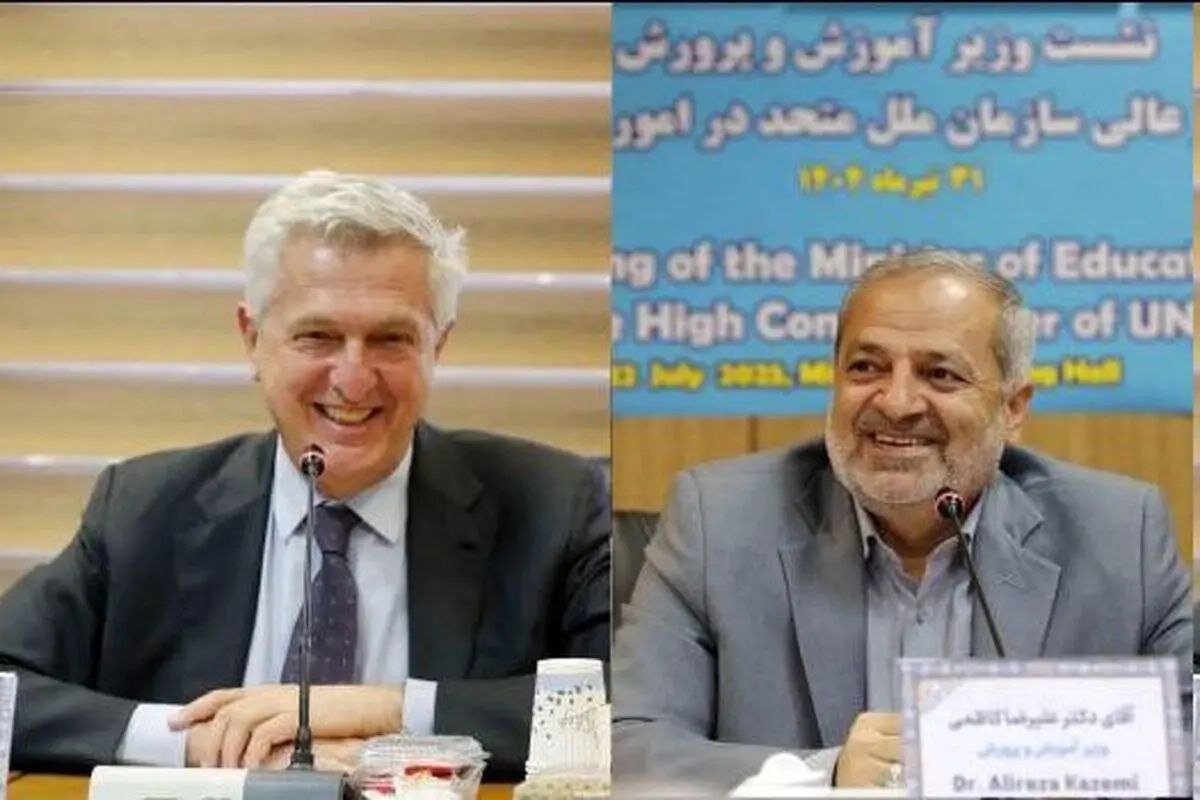UNHCR representative commends Iran's efforts in educating refugees

TEHRAN –United Nations High Commissioner for Refugees (UNHCR), Filippo Grandi, has lauded the efforts of the Education Ministry in supporting and providing services to foreign students.
“The main reason why I am visiting Iran is to appreciate the country’s valuable services provided to refugees. I have repeatedly talked about this issue in international forums, and urged them to follow Iran as a role model,” Mehr news agency quoted Grandi as saying.
The official made the remarks in a meeting with Education Minister Alireza Kazemi on Wednesday.
During the meeting, Grandi referred to Leader of the Islamic Revolution Ayatollah Seyyed Ali Khamenei’s statement in 2015, according to which all Afghan refugees, including undocumented ones, were allowed to be enrolled in schools. The official called it a valuable historical measure that surprised everyone, including rich countries.
For his part, Kazemi expounded on the country’s measures and challenges in assisting refugees.
Iran spends 100 million dollars annually on providing services to foreign nationals, while in the UNHCR contribution has been less than a percent over the past two years
The presence of refugee students at schools has made classes overcrowded, which has consequently affected Iranian students' academic performance, the official added.
Referring to the lack of educational space and the substantial financial burden of providing it, Kazemi said it is socially and economically costly; people expect these expenditures to be spent on Iranians, which is a logical demand.
The education minister went on to highlight the economic and social challenges caused by foreign nationals, saying that due to economic problems, Afghan refugees involve their children in helping generate income, which leads to severe social impacts in the country.
“Despite all these problems, Iran has never reduced the services provided to refugees. The country continues to provide the best services to legally permitted refugee students, ensuring none of them is deprived of education,” Kazemi noted.
Now that Afghanistan has attained stability, Afghan nationals are better able to return, with dignity, and serve their home country, he said.
Even to support (deported) refugees to continue education and learning, Iran is ready to educate all Afghan students using the local education platforms, within the framework of the tripartite cooperation agreement, and providing them with a valid educational certificate based on the statutes of virtual schools approved by the Supreme Council of Education, the official added.
Grandi lauded the proposal and voiced the UNHCR's support of the program, calling it an invaluable measure for the young generation.
“I am aware of low contributions, and I admit more funds have to be assigned to your services, but due to the current situation and sanctions, it is not possible. We are not a rich partner, but we would be happy to remain your partner,” the official said.
According to ISNA, Alireza Bigdeli, Iranian ambassador to Kabul, and Habibullah Aqa, acting Education Minister of Afghanistan, met on Thursday to discuss the potential for fostering educational, vocational education, and training cooperation.
Interior minister, UNHCR representative discuss issues on Afghan refugees
On Tuesday, Grandi also held a meeting with Interior Minister Eskandar Momeni to explore ways to address problems related to Afghan refugees living in the country and those being deported.
The meeting focused on holding a trilateral meeting among Iranian officials, Afghan officials, and UNHCR representatives to increase financial assistance from international organizations, organize Afghan refugees, and prevent drug trafficking, according to the Ministry of Interior’s website.
During the meeting, Grandi lauded Iran’s generosity in hosting refugees over the past four decades. “I’m personally well aware of the burden the country and the Iranian people are going through. Unfortunately, the international community’s support for Iran has significantly declined in recent years. However, we ask Iran to return (illegal) immigrants gradually, not to put Afghanistan under pressure because the country cannot accept them all at once due to economic and social problems.”
He also shared insights from his recent visit to Kabul, where he held discussions with officials from the Afghan interim government about refugee matters and voluntary returns.
The official hoped that Iran would continue its humanitarian approach with the contributions of the international community.
For his part, Momeni said, “Unauthorized refugees will be returned to their home countries without being asked any questions anywhere in the world. However, in Iran, if an Afghan’s life is threatened or if they are sick and need to stay here for treatment, their return will be delayed. They have not been deported violently.
Afghan governors have seen firsthand how the deported nationals were treated respectfully.”
The official went on to say that some three to four legal Afghans are residing in the country who are working and are respected by Iranians. Their children are attending the same schools as Iranians, and work in Iranian workshops, he added.
Nader Yar-Ahmadi, the head of the National Organization for Migration, for his part, said Iran has hosted Afghan refugees for over four decades, and will continue to do so in a different way, though. Only documented refugees will be able to benefit from the services in the country.
“Mr. Grandi has honestly confessed that international financial support is nothing compared to the country’s extremely costly measures. We expect the international community to enhance its assistance,” Yar-Ahmadi highlighted.
MT/MG
Leave a Comment